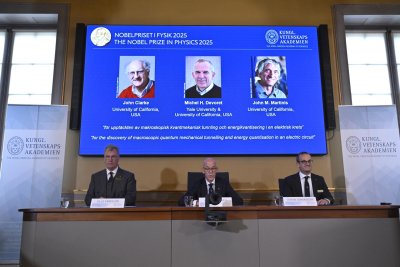1 of 4 | A trio of U.S. scientists won the Nobel Prize in physics for discoveries in quantum mechanics. Photo by Christine Olsson/EPA
Oct. 7 (UPI) — Three U.S.-based scientists won the Nobel Prize in physics for their work in quantum mechanics on a macroscopic scale, the Nobel Foundation announced Tuesday.
The Royal Swedish Academy of Sciences awarded British-born John Clarke (University of California, Berkeley), French-born Michel H. Devoret (Yale University and UC Santa Barbara) and American John M. Martinis (UC Santa Barbara) the prestigious award. It comes with a $1.17 million prize the three men will split evenly.
The scientists are being recognized for creating an electrical circuit system large enough to be held in the hand that demonstrated both quantum mechanical tunneling and quantized energy levels, or specific, measurable amounts of energy.
Tunneling is the ability for particles to move through a barrier. Once a large number of particles are involved, they’re typically unable to move through this barrier, also called a Josephson junction.
“The laureates’ experiments demonstrated that quantum mechanical properties can be made concrete on a macroscopic scale,” a release from the Nobel Foundation said.
Olle Eriksson, chair of the Nobel Committee for Physics, applauded the work by the three scientists.
“It is wonderful to be able to celebrate the way that century-old quantum mechanics continually offers new surprises,” he said. “It is also enormously useful, as quantum mechanics is the foundation for all digital technology.”
